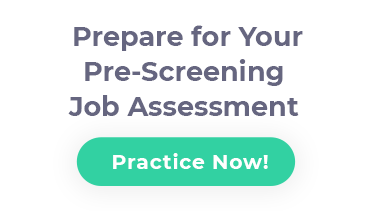Microsoft Hiring Process, Interviews & Assessment Test Preparation [2025]

What Is the Microsoft Hiring Process?
Microsoft is a staple in the digital age as well as a giant in the tech industry. They work to uphold their reputation and credibility by creating a rigorous hiring process that is infamous for its brain teasers. Those applying for a position at Microsoft can expect up to five recruitment rounds, each more difficult than the last. These stages of the hiring process include:
The recruitment process in companies owned by Microsoft is pretty similar to the one on Microsoft itself. The biggest companies owned by Microsoft are: LinkedIn, Skype, GitHub, Mojang, aQuantive, and ZeniMax Media.
Application
Microsoft has its own job portal where job seekers can apply for multiple positions all at once. In the application, it is important to highlight philanthropic endeavors, unique extracurriculars, and recent projects. Alongside the typical qualification and education inquiries, Microsoft also asks a handful of questions such as: “Where do you see yourself in five years?” and “What are your top strengths?”.
Online Aptitude Tests
Applicants will receive a series of online aptitude and behavioral tests via email after they have completed an application. Microsoft uses these assessments as an unbiased measure of the candidate’s intelligence and personality. While the assessments are subject to change based on the position that has been applied for, applicants will most likely encounter the following assessments:
- Inductive Reasoning Test
The inductive reasoning test is a key determinant in the Microsoft interview process because it demonstrates the problem-solving approach and critical thinking of the candidate. It’s a non-verbal assessment with a twenty-five-minute time limit. The test features a five-shape sequence and asks that the and requires the test-taker to find the sixth, missing shape. This occurs over twenty-four questions, each with multiple answer choices.
- Situational Judgment Test
The Situational Judgment Test, or SJT, is a behavioral assessment designed to appraise emotional intelligence. The SJT is tailored for multiple different levels that are dependent on the candidate’s amount of work experience; for example, there will be different versions for those applying for entry-level roles than those applying for managerial roles. The assessment is untimed and is structured around short, hypothetical scenarios. After reading the given scenario, the candidate must evaluate a follow-up statement detailing an action that has been taken. Then, the candidate will choose from a list of options whether that action was the correct one to take in that situation.
- Technical Aptitude Test
The technical aptitude test is solely focused on the responsibilities that a certain job entails and whether a candidate can carry them out properly. This assessment is less common for graduate and entry-level positions than it is for executives, managers and the like. Those who have applied for a position that requires knowledge about coding will most likely have to take the technical aptitude test.
Video Interview
The video interview takes a total of forty-five-minutes and zooms in on the range and depth of the capabilities a candidate possesses. There are fifteen questions, each accompanied by a three-minute time constraint. Common questions include:
- Tell us about the role you have applied for.
- How can Microsoft improve?
- Provide an example of a time you demonstrated leadership.
Candidates should know that this interview is conducted by a bot rather than a Microsoft recruiter or employee. Therefore, the interview is recorded and reviewed at a later time.
Interactive Assessment
The interactive assessment is a live interview performed over Skype. The candidate is asked to answer anywhere from seven to ten questions that emphasize their overall personality, how their personality aligns with the job as well as additional technical and competency-based questions.
This part of the interview process takes about half an hour and is overseen by an HR representative.
Microsoft’s Assessment Center
The assessment center is the final round of the Microsoft interview process and includes its own, separate substages. Every activity takes place on-site and wraps in a single day. After partaking in the exercises at the assessment center, candidates should be notified of their standing with the company within a week. The activities at the Microsoft assessment center include:
- Case Study
Given an hour-and-a-half, candidates must read through and evaluate case studies provided by Microsoft. Then, they must present a solution to the interviewers. Bonus points for those who thoughtfully articulate their thought process and the reasons behind their decisions.
- Face-to-Face Interview
There will be two total face-to-face interviews. One takes place toward the beginning of the day and reflects the topics of previous interviews while it is an end of the day evaluation-type interview. The second interview discusses the performance at the assessment center as well as some job-specific questions about the role.
- Group Exercise
A group of five to ten candidates are assigned an issue and provided with the tools to solve it. Microsoft is assessing candidates on their technical knowledge, but also notes each candidate’s role in the group dynamic as well as who assumed leadership positions. After a solution is found, the group must present it to the interviewers.
How to Prepare for Microsoft’s Aptitude Tests?
Microsoft utilizes online assessments for the sole purpose of minimizing the candidate pool. This increases the stakes significantly and makes quality performance key in this stage of the interview process. The best way to do well in these assessments is to prepare for them simply.
Most find it beneficial to take online practice tests that imitate the material and conditions of the genuine assessment. Job seekers can participate in a short or full-length version of the tests while receiving scores and being informed of areas that need improvement.
Others find sample questions to be more useful when preparing for the online assessments. Considering Microsoft’s emphasis on thought processes and learning styles instead of just answers, the sample questions may prove to be more advantageous than one might think. They encourage you to concentrate on the issue at hand without the stress of a ticking clock and allow you to further analyze your problem-solving approach.
Additionally, reviewing the questions—whether they were presented in the sample question format or practice test format—with a friend is always helpful. Stepping into someone else’s thought process can often time help you improve your own. Simply speaking the solution and logic to a problem out loud is even a constructive way to prepare yourself for the Microsoft online assessments.
How Are Microsoft Online Assessments Scored?
The online assessments are scored and administered through a neutral party. In this case CEB’s SHL assessment company. This assessment company scores the test takers using a percentile scoring system in place of a raw scoring system.
A percentile score has multiple components. First, is the norm group. A norm group is an established benchmark detailing the average performance of people in the same field and with the same experience as the test taker. So, a raw score, which is simply the number of correct answers, is compared against a predetermined norm group to generate a percentile score.
What does this mean for candidates for a position at Microsoft? Well, it reduces the importance of the raw score significantly. For example, if you were to get nineteen out of twenty-four questions right on the inductive reasoning test that would translate to an above-average score. But, if the norm group consistently achieves twenty-one out of twenty-four, your score loses value. It’s important to keep this mind while you are taking the assessments so you can put your best foot forward.
Interview Tips for Microsoft
There is no way to sugarcoat Microsoft’s interview process, it’s going to be tough. They look for the top one percent of people in every particular field to continue to cultivate ideas for growth and innovation. Particularly, they are looking for the following qualities:
- Desire to Learn
- Passion for Technology
- Diligence
- Intelligence
- Solid Skillset
- Entrepreneurial Spirit
- Desire to Excel
Throughout your multiple interviews with Microsoft, you will be asked numerous times how you relate to these qualities. You can cite recent projects, past experiences, or even mistakes you have made as long as you demonstrate how well you align with the above traits. These seven core characteristics are key to standing out in your interviews.
Conclusion
Jobs at Microsoft don’t come easy. Commit to your own success in their interview process by doing your due diligence and preparing for the hurdles that you know are coming your way. Best of luck!

